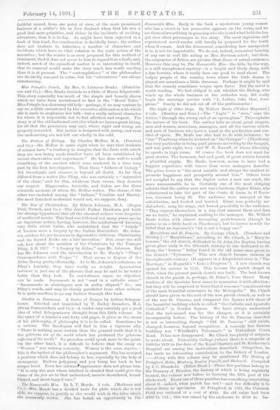The Light of Other Days. By Willert Beale (Walter Maynard.)
2 vols. (Bentley and Sons.)—The "Light" is "seen," says the writer, "through the wrong end of an opera-glass." This explains the nature of his book. The author tells us about groat singers, men and women, musicians, managers, and all the various artists and mon of business who have a hand in the production and con- duct of opera. Mr. Beale has also had to do with lecturers ; he "ran " Thackeray when he lectured on " the Georges "—(Thackeray was very particular in being paid guineas according to the bargain, and was quite right, too)—and W. H. Russell, of whose liberality he speaks in high terms. Of course the book does not want for good stories. The humours, bad and good, of groat artists furnish a plentiful supply. Mr, Beale, however, seems to have had a happier experience with tenors than some managers describe. The prime tenure is "the most amiable and always the readiest to promote happiness and prosperity around him." Others have not scrupled to say that the higher notes a man can reach, the more unreasonable he is. Certainly one of the most obliging soloists that the author ever mot was a baritone, Signor Kinni, who Volunteered to take the part of the Conte di Luna in It Trove- tore, Graziani being ill. The audience wore annoyed at the substitution, and hooted and howled. Kinni was perfectly un- disturbed; sang his songs, and bowed gracefully to the audience. " They express themselves in a way that amuses them and does me no harm," he explained, smiling to the manager. Mr. Willert Beale writes with almost unvarying good-humour (though he seems to us a little hard on Thackeray), but he leaves us with the belief that an impresario's "lot is not a happy one."


































 Previous page
Previous page